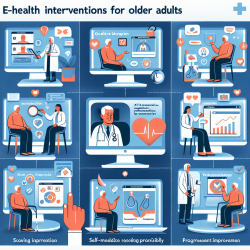Understanding the Impact of E-Health on Self-Medication Behaviors
The realm of e-health interventions has been gaining traction, especially in managing chronic conditions such as hypertension among older adults. The research article titled "Reducing Adverse Self-Medication Behaviors in Older Adults with Hypertension: Results of an e-health Clinical Efficacy Trial" provides valuable insights for practitioners looking to enhance their skills and improve patient outcomes.
Key Findings and Their Implications
The study involved 160 older adults with hypertension, who were randomly assigned to either a control group or an intervention group utilizing the Personal Education Program - Next Generation (PEP-NG). The intervention group showed significant improvements in self-medication knowledge and self-efficacy, with large effect sizes. This suggests that e-health interventions can effectively enhance patient understanding and management of their medication regimens.
For practitioners, this means that incorporating e-health tools like PEP-NG can lead to better patient engagement and adherence to medication protocols. The intervention also led to a reduction in adverse self-medication behaviors, highlighting the potential of tailored educational content delivered through technology.
Practical Applications for Practitioners
Practitioners can implement these findings by integrating e-health solutions into their practice. Here are some steps to consider:
- Adopt E-Health Tools: Utilize platforms like PEP-NG to provide personalized education to patients, enhancing their understanding of medication interactions and safe practices.
- Focus on Self-Efficacy: Encourage patients to take an active role in managing their health by boosting their confidence in medication management through interactive tools.
- Enhance Communication: Use the data and insights from e-health tools to facilitate more informed discussions with patients about their treatment plans and medication use.
Encouraging Further Research
While the study provides a robust framework for improving patient outcomes, it also opens avenues for further research. Practitioners are encouraged to explore additional e-health interventions and their impact on different populations and conditions. Investigating long-term adherence and the scalability of such interventions in diverse healthcare settings could provide further insights into optimizing patient care.
To read the original research paper, please follow this link: Reducing Adverse Self-Medication Behaviors in Older Adults with Hypertension: Results of an e-health Clinical Efficacy Trial.










